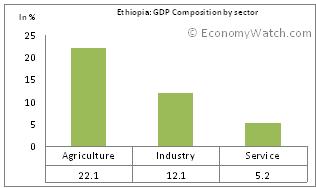Ethiopia Economic Structure
Please note that we are not authorised to provide any investment advice. The content on this page is for information purposes only.
Table of Contents
Ethiopia Economic Structure: GDP Composition
Ethiopia economic structure is unique in Africa. It has no oil or mining sector and virtually no private investment. With the country lacking basic growth components, Ethiopian economy is highly dependent on agriculture. In 2001, the country qualified for international aid under HIPC (heavily-indebted poor countries) initiative. Since then, the International Monetary Fund (IMF) is the leading foreign aid provider for the country.[br]
Ethiopia Economic Structure: GDP Composition
The Ethiopia economic structure is highly centralized. The government owns all the land and leases to citizens for long periods. Due to this fact, the business sector cannot use land as collateral for acquiring loans. Political instability and involvement in the Eritrean civil war during 1998-2000 is also responsible for this underdeveloped industrial sector.
Previously, the government used to transfer state property to state-owned enterprises in the name of privatization. Since 2003, the IMF intrusion has compelled government to undertake strategic economic reforms.
Owing to the archaic methods of farming, productivity across the country is considerably low. This, coupled with recurring droughts, has hampered Ethiopia’s agricultural production since 2002. However, coffee continues to drive the economy. It accounts for 10% of the GDP and provides almost 65% of the foreign exchange reserve.
As per the 2009 estimates, agriculture has the highest contribution (43.8%) in the country’s GDP; while it provides employment to almost 85% of the working population. Industrial and services sector has 13.2% and 43% share in the GDP respectively.
Ethiopia Economic Structure: Business Climate[br]
Before 2000s, Ethiopia economic structure has no involvement of private or foreign investment. With the inflow of foreign aid, the country liberalized its trade and investment policies to allow private investment. Although, the business climate is not ideal for new businesses, it is gradually becoming favorable with new economic reforms in place.
After 2005, Ethiopia has attracted foreign investment in coffee production, floriculture and leather industry. In 2007-2008, it was the fastest growing non-oil economy in Africa.





